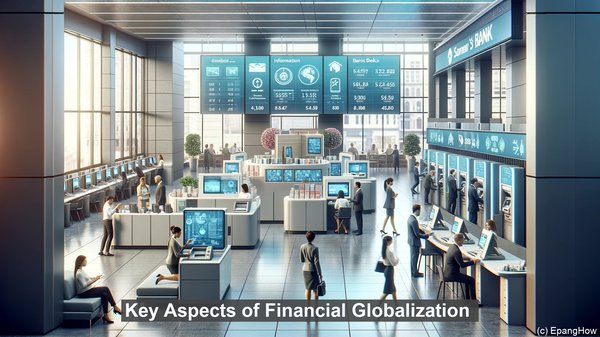Introduction: The Global Nature of Modern Economy
Hello everyone! In today’s interconnected world, the global economy plays a pivotal role in shaping the fortunes of nations. Two terms that often come up in discussions about the international economic landscape are ‘financial globalization’ and ‘economic globalization.’ While they may sound similar, they actually represent distinct aspects of the global economic system. Let’s delve deeper into these concepts and understand their differences.
Financial Globalization: The Flow of Capital
Financial globalization primarily refers to the integration of financial markets and institutions on a global scale. It involves the seamless movement of capital across borders, facilitated by advancements in technology and communication. This phenomenon has led to the emergence of a truly interconnected global financial system, where investments, loans, and other financial transactions occur on a transnational level. The rise of multinational banks, the proliferation of financial instruments like derivatives, and the establishment of global financial centers are all manifestations of financial globalization.

Key Aspects of Financial Globalization
Several key aspects define financial globalization. One of them is the liberalization of capital accounts, which entails reducing restrictions on cross-border capital flows. This has both advantages and disadvantages. On one hand, it allows for greater access to international capital, enabling countries to attract investments and finance development projects. On the other hand, it can also lead to increased volatility, as seen during financial crises when capital rapidly flows out of a country, causing economic instability.

Economic Globalization: Beyond Finance
While financial globalization focuses on the movement of capital, economic globalization encompasses a broader range of factors. It refers to the integration of economies through trade, investment, and the exchange of goods and services. Economic globalization is not limited to the financial sector; it extends to industries, supply chains, and labor markets. The establishment of multinational corporations, the growth of global value chains, and the rise of outsourcing are all manifestations of economic globalization.
Interconnectedness and Its Implications
Both financial globalization and economic globalization are driven by the idea of interconnectedness. The world is no longer a collection of isolated economies; it is a complex web of interdependencies. This interconnectedness has its advantages. It allows for the efficient allocation of resources, the transfer of technology and knowledge, and the potential for economic growth. However, it also means that shocks in one part of the world can quickly reverberate across the globe. The 2008 financial crisis, which originated in the United States, is a stark example of how interconnectedness can amplify the impact of a crisis.
